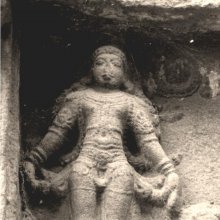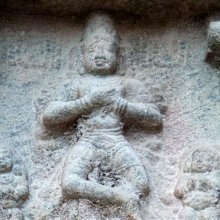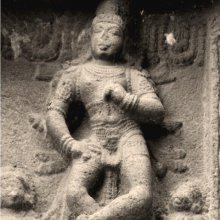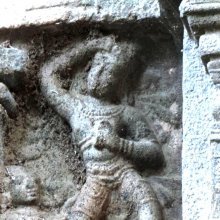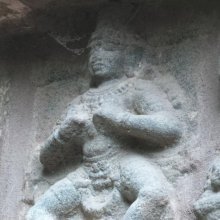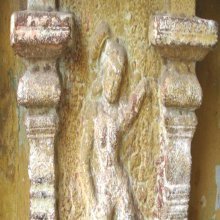Sharngadeva, Śārṅgadevā: 4 definitions
Introduction:
Sharngadeva means something in Hinduism, Sanskrit. If you want to know the exact meaning, history, etymology or English translation of this term then check out the descriptions on this page. Add your comment or reference to a book if you want to contribute to this summary article.
The Sanskrit term Śārṅgadevā can be transliterated into English as Sarngadeva or Sharngadeva, using the IAST transliteration scheme (?).
Images (photo gallery)
(+5 more images available)
In Hinduism
Purana and Itihasa (epic history)
Source: Cologne Digital Sanskrit Dictionaries: The Purana IndexŚārṅgadevā (शार्ङ्गदेवा).—One of the wives of Vasudeva and mother of Tumbu.*
- * Vāyu-purāṇa 96. 177.

The Purana (पुराण, purāṇas) refers to Sanskrit literature preserving ancient India’s vast cultural history, including historical legends, religious ceremonies, various arts and sciences. The eighteen mahapuranas total over 400,000 shlokas (metrical couplets) and date to at least several centuries BCE.
Languages of India and abroad
Sanskrit dictionary
Source: Cologne Digital Sanskrit Dictionaries: Aufrecht Catalogus CatalogorumŚārṅgadeva (शार्ङ्गदेव) as mentioned in Aufrecht’s Catalogus Catalogorum:—from Kāśmīra, son of Soṭhala, grandson of Bhāskara: Saṃgītaratnākara.
Source: Cologne Digital Sanskrit Dictionaries: Monier-Williams Sanskrit-English DictionaryŚārṅgadeva (शार्ङ्गदेव):—[=śārṅga-deva] [from śārṅga] m. Name of the author of the Saṃgīta-ratnākara, [ib.]
[Sanskrit to German]
Sanskrit, also spelled संस्कृतम् (saṃskṛtam), is an ancient language of India commonly seen as the grandmother of the Indo-European language family (even English!). Closely allied with Prakrit and Pali, Sanskrit is more exhaustive in both grammar and terms and has the most extensive collection of literature in the world, greatly surpassing its sister-languages Greek and Latin.
See also (Relevant definitions)
Partial matches: Sharnga, Deva, Teva.
Query error!
Full-text (+202): Shinghanadeva, Sharngideva, Raudri, Krodha, Vajrika, Alapini, Madanti, Tivra, Priti, Marjani, Ratika, Kshiti, Kumudvati, Dayavati, Kshobhini, Ugra, Chandovati, Ramya, Sothala, Manda.
Relevant text
Search found 11 books and stories containing Sharngadeva, Śārṅga-deva, Sarnga-deva, Śārṅgadevā, Sarngadeva, Śārṅgadeva, Sharnga-deva; (plurals include: Sharngadevas, devas, Śārṅgadevās, Sarngadevas, Śārṅgadevas). You can also click to the full overview containing English textual excerpts. Below are direct links for the most relevant articles:
Notices of Sanskrit Manuscripts (by Rajendralala Mitra)
Hastalaksanadipika a critical edition and study (by E. K. Sudha)
2. Authorship and Antiquity of the Abhinaya-darpana < [Chapter 3 - Later developments of dramatic techniques]
5. study of Balaramabharata < [Chapter 3 - Later developments of dramatic techniques]
4. Nandikesvara and Balarama-varma—their views in relation to the Hastalaksanadipika < [Chapter 1 - Introduction]
Gati in Theory and Practice (by Dr. Sujatha Mohan)
Observations on Gati aspects < [Chapter 2 - Concept and technique of Gati]
Analysis of technical terms: Mārga and Deśī < [Chapter 1 - Nāṭya]
Gati in works on Nāṭya < [Chapter 2 - Concept and technique of Gati]
Natyashastra (English) (by Bharata-muni)
Part 3 - Literature on Ancient Indian Music < [Introduction, Part 2]
Part 1 - The Present Work < [Introduction, Part 2]
Gita-govinda of Jayadeva (comparative study) (by Manisha Misra)
1. Introduction (musical potentials) < [Chapter 7 - A comparative analysis of musical potentials of both the works]
6. Comparison of the Talas < [Chapter 7 - A comparative analysis of musical potentials of both the works]
10. Musical Estimate (h): Individual definition of the Talas < [Chapter 3 - A Critical and Musical study of the Gita-Govinda]
Informal Education of Sanskrit in Kerala (by Jayasree M.)
22. Classical Music and Dance forms < [Chapter 3 - Informal Education of Sanskrit in Kerala: the Traditional Streams]
